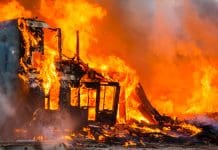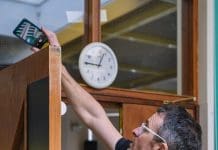Independent experts have said that no change is needed to building fire safety advice following the test failure of a fire door from Grenfell Tower
In a written statement to the Commons, secretary of state for housing, Sajid Javid, confirmed further investigations into such doors – manufactured by Manse Masterdor.
Manse Masterdor is no longer trading and is not associated with organisations of a similar name.
Marketed to resist fire for at least 30 minutes the door failed testing after approximately 15 minutes.
The government sought advice from the independent expert panel on the test findings to determine whether any further action was required as a result.
Javid outlined the government as having established a technical group of experts providing specialist advice on fire doors with capacity secured to test fire doors at accredited test houses.
He said the panel consulted representatives from the Metropolitan Police, the government’s chief scientific advisers and the National Fire Chiefs’ Council to advise whether there should be any changes to the fire safety advice that the public should follow.
“We are working closely with devolved administrations and are engaging with local authorities who are supporting us in our investigation,” he said.
The statement offered an update on the investigations ‘as and when’ the expert panel provided further advice, or no later than the end of May.
Javid referenced the ongoing Hackitt review of the regulatory framework around construction, maintenance and ongoing management of buildings in relation to fire safety.
This week, the review was criticised by Royal Institute of British Architects (RIBA) over concerns that it would stop short of proposing a ban on flammable cladding on tower blocks.
RIBA also fears neither sprinkler systems nor extra escape staircases would be required either – and has written to the housing secretary saying these ‘significant concerns’ seem to have been overlooked.
Building inspectors visited the tower during its refurbishment from 2014 to 2016 and signed it off as compliant with government fire safety guidance despite it being fitted with combustible plastic core-cladding panels.
The highly complex system of building regulations and guidance was quickly identified as a key problem.
In December, Hackitt described the system as ‘not fit for purpose’ and open to abuse by those trying to save money.
The combustible cladding is being stripped from buildings across the country but Hackitt has indicated that she would resist banning flammable cladding altogether.
Hackitt has said she would not propose a new building regulations system that “tells people what to do” but which “creates a culture where there is a clear focus on building and maintaining safety throughout the lifetime of buildings”.
This approach has led to fears in parts of the construction industry that the complexity which has led to so many problems with the use of combustible cladding will remain and residents will still have to rely on fire engineers and testing specialists, such as the Building Research Establishment, to know if they are safe.
RIBA believes it would be better and simpler to ban cladding of any type of combustibility altogether.
Javid last week commissioned a separate review of desktop studies of fire risk – a process of assessing the danger posed by fire in a particular building design by analysing the different test results of its components rather than fire testing the whole design.
















